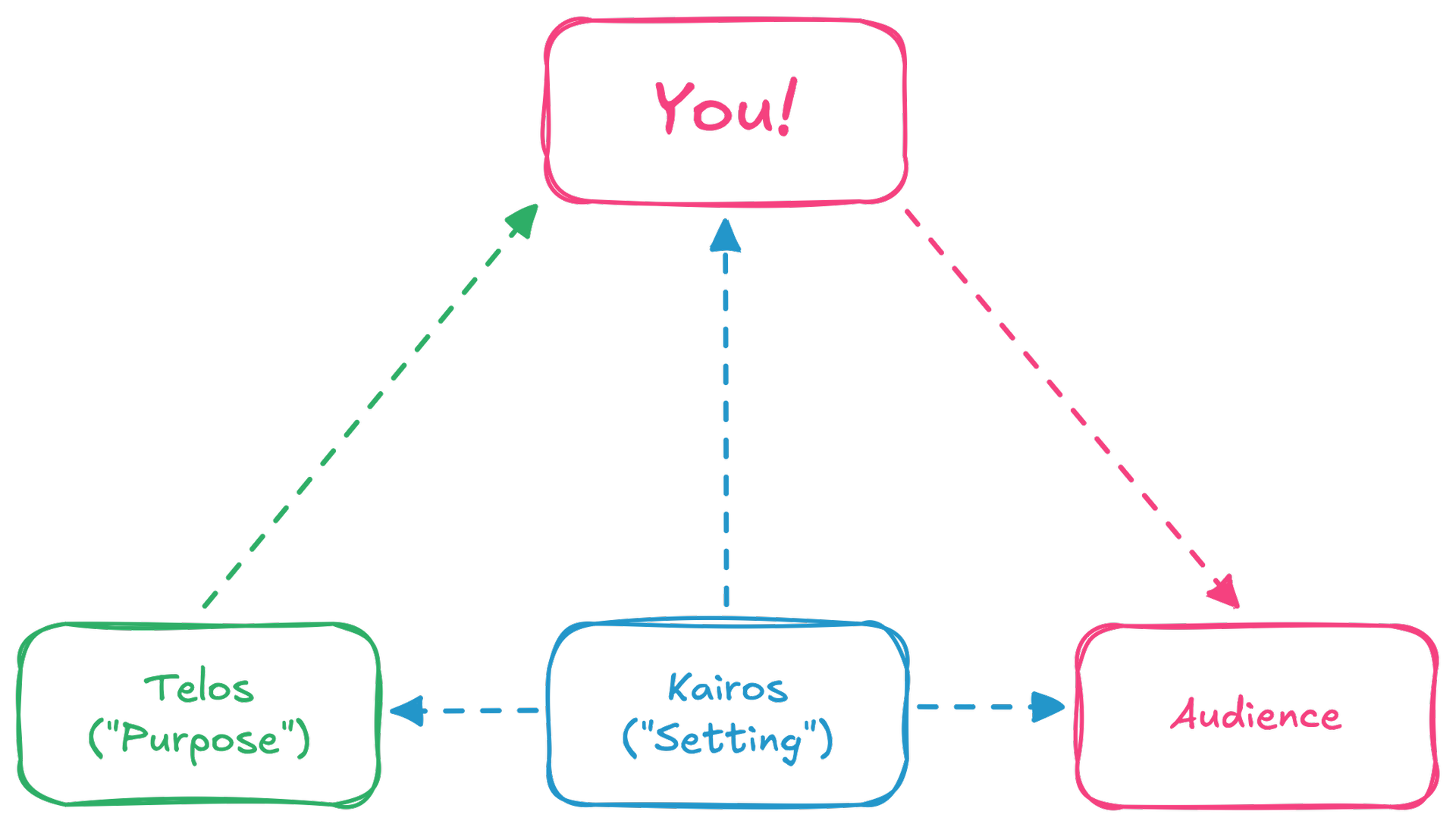A Maker's Guide to Rhetoric
Published on November 9th, 2024 by Caer
"It's a rhetorical question"—this statement comes up a lot, but do you know what "Rhetoric" actually is? Let's seize the Exigency, and find out.
I believe communication is the most important skill a person can hone. Even though my work mainly involves making massive software systems, my most valuable education wasn't in computer sicence or engineering —it was my degree in Professional Rhetoric.
But what is Rhetoric?
Rhetoric traces its origins to the Greek words rhetor ("speaker") and techne ("art" or "skill"). Aristotle is credited with establishing Rhetoric more than 2000 years ago, defining Rhetoric (roughly) as:
"A tool for finding all available means of persuasion in an argument."
— Aristotle, in Rhetoric
Here, Argument doesn't imply a conflict; it only means that someone is presenting a purpose to an audience, with the intent of convincing that audience to come to some conclusion or decision.
Situation: Know the Context

The Rhetorical Triangle is a visualization of Aristotle's foundational theory of rhetoric. In most depictions, the triangle consists of:
Audience: The person or people your argument is meant to address, from broad demographics (like
"everyone") to a specific person (like"Alex from the Analytics team").Telos: The purpose or intent of your argument. Telos can be mundane (like
"to say hello") or highly complexicated (like"to distill our 3rd quarter financials so the c-suite makes a not-terrible funding decision for our team").Kairos: The context or setting of your argument. Often simplified to mean Exigency (a moment or event that motivates the argument), Kairos refers to the foundational supports— time, place, and broader context—of your argument.
In so many of the examples in academia, You—the "Rhetorician"— are not included in the diagram, so the one I've shown above is modified slightly to include where you (typically) fit into the rhetorical situation.
Note: This log is a very brief summary of the theory of Rhetoric; for more detailed information, take a peek at Purdue OWL's and Arizona State University's writeups on Rhetoric.
Appeals: Know the Audience
The Rhetorical Appeals are the means by which You appeal to the Audience to further your purpose via argument. These appeals consist of:
Logos: The appeal to logic and reason.
What data, facts, or expert opinions support your purpose?
Ethos: The appeal to ethics and character.
How trustworthy and credible are you, in the eyes of your audience? What knowledge or expertise do you have relating to your purpose? Do you treat others with fairness and respect? Do you present your purpose with confidence and in good-faith?
Pathos: The appeal to emotions.
How do you connect with your audience emotionally? What stories, feelings, anecdotes, or humour can you draw upon as you present your purpose to the audience?
For an argument to be successful, most rhetoricians agree that it should have a strong balance of each of these appeals; in a perfect world, the audience should find you logical and credible, while feeling an emotional connection to you.
Note: Although Telos and Kairos are technically their own Appeals (per Aristotle's original teachings), most resources only consider Logos, Ethos, and Pathos as "The Rhetorical Appeals". Unfortunately, most easily accessible resources also skip over the rhetorical situation entirely, and only discuss these three appeals.
Practicing Rhetoric
Nearly all communication can be analysed through the lens of rhetoric. Consider this log:
I began by sharing my feelings about the importance of communication and rhetoric, which is a Pathos appeal.
Within the first paragraph, I shared that I studied rhetoric in a formal setting, receiving a degree for my efforts, which is an Ethos appeal.
Throughout this log, I include diagrams, definitions, quotes, and links to support my writing, which are all examples of Logos appeals.
But...it can be hard, and perhaps boring, to consider all the ways rhetoric works its way into written communication. That's why one of my favorite ways to explore rhetoric is to watch ads.
Advertisements are a delightful medium for studying rhetoric: Their audience, purpose ("Telos"), and context ("Kairos") are often clear, leaving you free to study the logic ("Logos"), credibility ("Ethos"), and emotions ("Pathos") they leverage in their argument ("Appeal") to viewers.
Next time your ad-blocker fails you, why not take that moment to analyse the rhetoric within that ad?
Be the first to get my insights on tech:
Get My Newsletter
and follow me on your favorite social network
all views expressed are my own, and
don't reflect those of my clients or employers